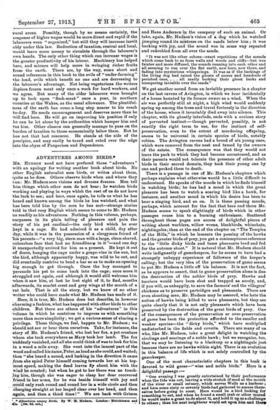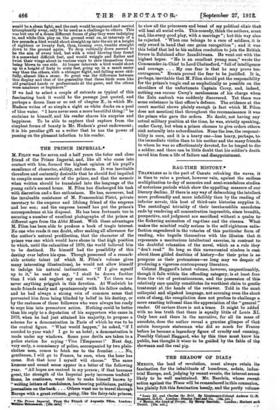ADVENTURES AMONG BIRDS.*
Ms. HUDSON need not have prefaced these " adventures " with an apology for writing another book- about birds. No other English naturalist sees birds, or writes about them, aquae as be does. Others observe birds when and where they Can: Mr. Hudson sees visions and dreams dreams. Men tell him things which other men do not hear ; he watches birds working and playing in ways which the rest of us do not have the luck to see; and here, once again, he tells us what he has beard and known among the birds he has watched, and what has been told him by the men he has met—strange stories told in that easy English which seems to come to Mr. Hudson us readily as his adventures. Nothing in this volume, perhaps, surpasses in its plain telling of pleasure and pain the story of his pet cardinal—the only bird which he ever
lept in a cage. He had admired it as a child, day after day, while it was in the possession of a clergyman friend of parents—" a very big, stern man with a large, clean-shaved,
Colourless face that had no friendlinerf in it "—and one day it unexpectedly arrived for him RS a present. He kept it out of doors, banging the cage under a grape-vine in the sun, but the bird, although apparently happy, was wild to be out, and did eventually contrive to bend a bar so as to make an opening big enough to get through. Once the boy managed to persuade his pet to come back into the cage; once more it struggled out again, and although it would still welcome him when it saw him, at last he lost sight of it, to find, months
afterwards, its scarlet crest and grey wings at the mouth of a rat bole. That is all the story, but we know of no other -writer who could have made what Mr. Hudson has made of it. ,Here, it is true, Mr. Hudson does but describe, in however charming a fashion, what has happened with other birds to other children. But there are others of his "adventures" in this -volume in which he contrives to impress us with something more than mere simplicity ; we get a curious sense of sharing a privilege. These things, we feel, happen to Mr. Hudson ; we should not see or hear them ourselves. Take, for instance, the story of Mr. Hudson's friend, who lost her fox, a pet creature -whom she took everywhere as Mary took her lamb. The fox Suddenly vanished, and all she could think of was to look for him in a wood a mile away. She went into the inmost part of the wood and called his /mine, Peter, as loud as he could, and waited; then "she heard a sound, and looking in the direction it came from she spied Peter himself coming towards her. at his top- most speed, making the dead leaves fly about him with the wind he created; but when he got to her there was no touch- ing him, though she was eager to clasp her dear recovered
friend in her arms, for he was beside himself with joy and !could only rush round and round her in a wide circle and then charging straight at her leaped clear over her bead, and then again, and. then a third time!" We are back with Grimm • '1 Adventures among- Birds. By W. H. Hadson. -LOndon Hutchinson and 4C.o. [10s. 6d. net.] and Hans Andersen in the company of such an animal. Or take, again, Mr. Hudson's vision of a dog which he watched
jumping round its mistress on the sands below him; it was barking with joy, and the sound was in some way repeated and redoubled from all over the sands.
It was not like other echoes—exact repetitions of the sounds which come back to us from walls and woods and cliffs—but was fainter and more diffused, the sounds running into each other and all seeming to run over the fiat earth, now here, now there, and fading into mysterious whisperings. It was as if the barkings of the living dog had raised the ghosts of scores and hundreds of perished ones, . . . all madly barking their ghost barks and scampering invisible over the sands."
We get another sound from an invisible presence in a chapter on the last ravens of Avington, in which we hear incidentally of a Louse haunted by its former owner as a wind. When the air was perfectly still at night, a high wind would suddenly spring up among the trees and travel furiously in the direction of the house, where it invariably died away into silence. This chapter, with its ghostly interlude, ends with a curious story of perverted instinct though perverted, possibly, is not exactly the right term to use, for the instinct of self- preservation, even to the extent of murdering offspring, seems to be universal in certain species of birds, notably robins. The Avington ravens bad a brood of six young ones; which were removed from the nest and tamed by the owners of the estate. • The consequence was that they would not leave the park to which they bad become accustomed, and as their parents would not tolerate the presence of other adult birds in their sacred domain, they took their young one by one and pecked them to death.
There is a passage in one of Mr. Hudson's chapters which perhaps explains what otherwise would be a little difficult to understand. He speaks of the moods in which he finds himself in watching birds ; he has had a mood in which the great pleasure has been to watch a soaring bird like a hawk, for instance, and another mood in which his desire has been to hear a singing bird, and so on. It is these passing moods; perhaps, which account for the fact that here and' there Mr. Hudson seems to speak slightingly of birds which in other passages rouse him to a burning enthusiasm. Scattered throughout these pages are scores of delightful pieces of writing about warblers, willow wrens, blackbirds, whinchats, nightingales ; then at the end of the chapter on "The Temples of the Hills," in which he laments the passing of the hawks and the greater birds of prey, you get a contemptuous reference to the "little dicky birds and tame pheasants bred and fed for the autumn shoot." It is natural that Mr. Hudson should write indignantly of gamekeepers, for be seems to have had a.
strangely unhappy experience of followers of the keeper's calling; but the very idea of the preservation of game seems to put Mr. Hudson a little off his balance. It is not the fact, as lie appears to assert, that to game preservation alone is due the destruction of the nobler birds of prey. Hawks and
harriers would have been shot and trapped as surely, and, if you will, as unhappily, to save the farmers' and the villagers' chickens as to preserve partridges and pheasants. There are even shooting men, Mr. Hudson may be assured, who hate-the notion of hawks being killed to save pheasants, but they see quite clearly that it is not only pheasants which have been preserved by the destruction of the great birds of prey. One
of the consequences of the preservation or over-preservation of game has been the protection afforded to the smaller and weaker species—the "dicky birds," which have multiplied undisturbed in the fields and coverts. There are many of us who, like Mr. Hudson, take a great delight in watching the circlings and soarings of a noble hawk ; but we recognize, too, that we May be listening to a blackcap or a nightingale just because there are no hawks within sight. There is an evolution in this balance of life which is not solely controlled by the gamekeeper.
One of the most characteristic chapters in this book is devoted to wild geese—" wise and noble birds." Here is a delightful passage :—
" One evening I was greatly entertained by their performance when the tide was out, leaving a wide stretch of mud at the mouth of the river or small estuary, which- serves Wells as a harbour and here some sixty or seventy birds had gathered to amuse them- selves before going to roost. Here would be a bird looking for: something to eat, and when he found a small crab or other morsel he would make a-great to-do about it, and hold it up as a challenge to others ; then his next neighbour would set upon him And gutty
would be,e. sham fight, and the crab would be captured and carried triumphantly away, only to be used as a challenge to others. This was but one of a dozen different forms of play they were indulging in, and while this play on the ground went on, at intervals of a few seconds a bird would shoot straight up into the air at a height of eighteen or twenty feet, then, turning over, tumble straight down to the ground again. To drop vertically down seemed to be the aim of every bird, but with a wind blowing they found it a somewhat difficult feat, and would wriggle and flutter and twist their wings about in various ways to save themselves from being blown to one side. At longer intervals a bird would shoot up to a height of forty to sixty feet, going up in a much easier way than the others, with a stronger flight, and falling more skil- fully, almost like a stone. So great was the difference between this display and that of the generality that these birds were like old practised hands or professionals at the game, and the others were amateurs or beginners."
If we had to select a couple of extracts as typical of this fascinating took it would be the passage just quoted, and perhaps a dozen lines or so out of chapter X., in which Mr. Hudson writes of so simple a sight as white ducks on a pool of blue water. "I have never seen a more beautiful thing !" he exclaims to himself, and his reader shares his surprise and happiness. To be able to capture that rapture from the simplest forms of beauty is Mr. Hudson's great endowment ; it is his peculiar gift as a writer that he has the power of passing on the pleasant infection to his reader.











































 Previous page
Previous page